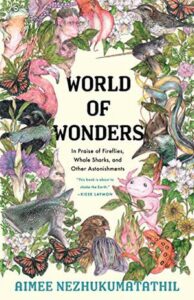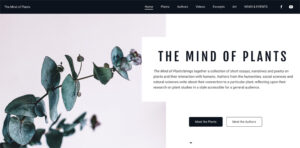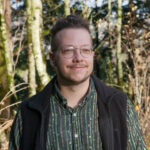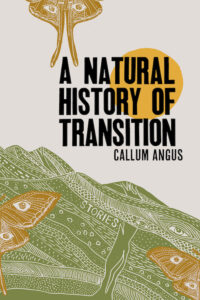This episode was recorded on Friday, March 19, 2021
Co-Hosts: Laura Barbas-Rhoden, Heather Swan
Featured Guests/Works:
 Aimee Nezhukumatathil, World of Wonders: In Praise of Fireflies, Whale Sharks, and Other Astonishments
Aimee Nezhukumatathil, World of Wonders: In Praise of Fireflies, Whale Sharks, and Other Astonishments
World of Wonders is the New York Times bestselling collection of illustrated nature essays celebrating the way plants and animals can teach, support, and inspire us, and about the lessons learned growing up as an Asian American woman. The axolotl teaches us to smile, even in the face of unkindness; the touch-me-not plant shows us how to shake off unwanted advances; the narwhal demonstrates how to survive in hostile environments. Even in the strange and the unlovely, Nezhukumatathil finds beauty and kinship. This debut nonfiction collection has been chosen as Barnes & Noble’s Book of the Year 2020, named an NPR Best Book of 2020, and a Finalist for the Kirkus Prize in non-fiction, among many other honors.
Aimee Nezhukumatathil is also the celebrated author of four books of poetry: Oceanic (Copper Canyon Press, 2018), winner of the Mississippi Institute of Arts and Letters Award; Lucky Fish (2011) winner of the gold medal for the Independent Publisher Book Awards, At the Drive-In Volcano (2007), winner of the Balcones Prize; and Miracle Fruit (2003). Her awards include a Guggenheim and an NEA fellowship. She is professor of English and teaches environmental literature and poetry writing in the MFA program of the University of Mississippi.
 Patricia Vieira, The Mind of Plants
Patricia Vieira, The Mind of Plants
The Mind of Plants offers an accessible account of the idea of “the plant mind” by bringing together short essays, narratives and poems on plants and their interactions with humans. The texts interpret the theme broadly, from the ways that humans mind and unmind plants to the mindedness or unmindedness of plants themselves. Authors from the humanities, social sciences, and natural sciences have written about their personal connections to particular plants, reflecting upon their research on plant studies in a style amenable to a broad audience. Each of the authors has selected a plant that functions as a guiding thread to their interpretation of “the mind of plants.”
Patrícia Vieira is Professor of Spanish and Portuguese at Georgetown University and Senior Researcher at the Centre for Social Studies (CES) of the University of Coimbra. Her fields of expertise are Latin American and Iberian Literatures and Cultures, Utopian Studies and the Environmental Humanities. For more information visit: www.patriciavieira.net.
 Sarah Giragosian, The Death Spiral
Sarah Giragosian, The Death Spiral
The Death Spiral asks what it means to be a human in our age, to be at once a meddler, a tinkerer, a destroyer, a killer, as well as a rehabilitator and steward. It is addressed to those who are interested in re-thinking our role in the natural world from a position of dominance to one of co-existence and re-imagining our planetary citizenship as one defined by an ethics of responsibility towards one another, the earth, and its creatures. A product of the Anthropocene, The Death Spiral asks what is “Nature” but something of us and beyond us? It is the incarcerated bittern so isolated from her own species that she falls in love with the zoo director, the sea cucumbers slick with oil, the smokestack-studded sky, the scientist toying with the extinct mammoth’s DNA. However, the collection also looks for and finds examples of resilience in the wildlife around us.
 Sarah Giragosian is the author of the poetry collections Queer Fish (winner of the American Poetry Journal Book Prize, 2017) and The Death Spiral (Black Lawrence Press, 2020), as well as co-editor, with Virginia Konchan of Marbles on the Floor: How to Assemble a Book of Poems (University of Akron Press, forthcoming). She teaches at the University at Albany-SUNY.
Sarah Giragosian is the author of the poetry collections Queer Fish (winner of the American Poetry Journal Book Prize, 2017) and The Death Spiral (Black Lawrence Press, 2020), as well as co-editor, with Virginia Konchan of Marbles on the Floor: How to Assemble a Book of Poems (University of Akron Press, forthcoming). She teaches at the University at Albany-SUNY.
Callum Angus, A Natural History of Transition
A Natural History of Transition is a collection of short stories that disrupts the notion that trans people can only have one transformation. Like the landscape studied over eons, change does not have an expiration date for these trans characters, who grow as tall as buildings, turn into mountains, unravel hometown mysteries, and give birth to cocoons. Portland-based author Callum Angus infuses his work with a mix of alternative history, horror, and a reality heavily dosed with magic.
 Callum Angus is a trans writer and editor currently based in Portland, Oregon. His work has appeared in Nat. Brut, West Branch, LA Review of Books, Catapult, The Common, Seventh Wave Magazine and elsewhere. He has received support from Lambda Literary and Signal Fire Foundation for the Arts, and he holds an MFA from the University of Massachusetts Amherst. He edits the journal smoke and mold, and his first book of stories, A Natural History of Transition, is forthcoming from Metonymy Press in April 2021.
Callum Angus is a trans writer and editor currently based in Portland, Oregon. His work has appeared in Nat. Brut, West Branch, LA Review of Books, Catapult, The Common, Seventh Wave Magazine and elsewhere. He has received support from Lambda Literary and Signal Fire Foundation for the Arts, and he holds an MFA from the University of Massachusetts Amherst. He edits the journal smoke and mold, and his first book of stories, A Natural History of Transition, is forthcoming from Metonymy Press in April 2021.


